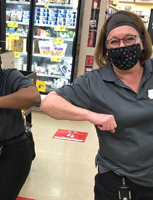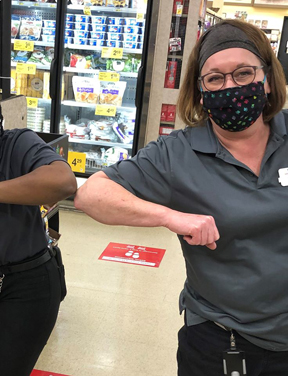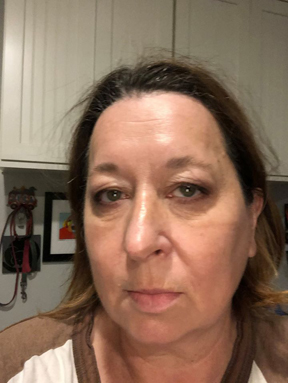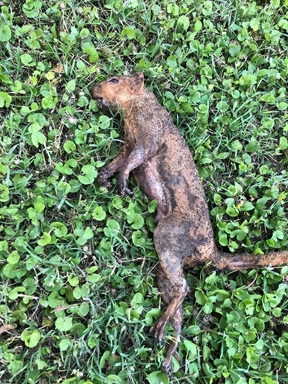With a pandemic-prompted job change, Dr. Melinda Merck finds new purpose

Merck eblow bump 288

Photo courtesy of Dr. Melinda Merck
A forensic-veterinarian-turned-grocery-worker, Dr. Melinda Merck elbow bumps a coworker, celebrating their effort to keep the store open through a power outage.
Dr. Melinda Merck saw the potential scope of the COVID-19 pandemic early on. In February, weeks before most Americans reacted to the looming emergency, the Austin-based forensic veterinarian began stocking up on home staples she thought might become scarce.
By mid-March, her apprehension focused on the job front. A self-employed consultant, she assists investigators on animal cruelty cases and frequently speaks about veterinary forensics. With conferences and meetings canceled and a slowdown in investigations, she wrote on Facebook, "... the 'gig is up' for the foreseeable future."
In the past, she'd daydreamed about working in the grocery business. Now that it was crunch time, she took the leap.
One week before the governor of Texas issued a statewide stay-at-home order on March 31, Merck applied at a neighborhood grocery store for any opening. She was promptly hired. Since day one, she's been writing about her experiences, in Facebook posts she calls My Career Shift Blog.
In elliptical prose punctuated with smiley emojis, Merck describes life as an essential worker during the pandemic. She chronicles the fear and anxiety of shoppers and coworkers, but zeroes in on stories of kindness, generosity and humor.
Her first day set the tone for the days and weeks to come. The store's computer system was overloaded, so she couldn't take the online training program. Instead, she was launched straight into the backbreaking work of sanitizing high-traffic areas in the store, repeating the cleaning every hour. She drew on her clinic experience, she wrote: "[J]ust treat it like a shelter or veterinary hospital responding to an outbreak."
Merck reported that she quickly perfected a cleaning routine, and found time to help frustrated customers find substitute products — including vegan alternatives for sour cream and sausage patties — on nearly empty shelves.
Within days, Merck was bagging groceries and working the register with no prior training. By week two, she was an assistant manager.
Through it all, she called on skills learned as a practitioner and practice owner. She developed checklists for regular tasks, enlisted volunteers to donate fabric and sew masks for the workers, and strived to tackle daily problems (shortages, shoplifters, slip hazards) in stride.
"I remember in practice something happened every day," she told the VIN News Service. "We always joked, it was by 2 o'clock, something happened. You had to be able to adjust. You had to be fluid, not rigid."
Maskless Merck 288

Photo by Dr. Melinda Merck
Hours after she'd come home from her job at the grocery store and removed her mask, Dr. Melinda Merck noticed mask lines indenting her face. She calls them a "badge of honor."
Returning home each day, she "decons" like she's been treating panleukopenia and ringworm all day.
'Undercover grocery store worker'
Merck, 56, said that she generally keeps her veterinarian status on the QT in the store. However, several of her blog posts feature her revealing her true identity — almost super-hero style — including one time when she disputed a customer's claims that cats were evil and had venom in their claws. Another time, Merck steered a young woman away from purchasing an Easter lily as a gift for her cat-owning mother. Eventually, a manager allowed Merck to post information about lily toxicity and cats near the flower display. She counts these as small victories for her alter ego.
In the 1990s, Merck owned a feline practice in Atlanta. She gravitated to cats because, she said, she found them more challenging and rewarding than dogs. "My goal was to get them to purr before they left," she said. While in practice in Atlanta, she began working with shelters and rescue organizations. She offered free exams, spays and neuters.
She said she developed a reputation as someone who wasn't afraid to report animal cruelty and hoarding — so much so, she was invited to join a legal group working to improve law enforcement response to animal cruelty in the Atlanta area.
From that experience, Merck said she got to know medical examiners. Curious about the field, she began studying human forensic science and pathology. She took classes in crime-scene and bloodstain-pattern analysis, and began adapting what she learned to animals. She authored Veterinary Forensics, the first textbook on the subject. To this day (although not so much during the pandemic), she still develops curriculum and leads training for law enforcement and veterinarians.
As with her clinical and practice management skills, Merck has found ways to deploy her forensic skillset in her new occupation, literally and literarily. On April 10, Merck wrote: "… crime scene investigation skills applied … found pool of white liquid in one section, then followed the trail to another pool, finally figured out it was not a spill issue but a case of the melting ice cream shopper, pausing in areas then moving on … trail went 'cold,' perp never found!"
A power outage — caused by a squirrel in a transformer — on April 17 allowed her to strut her stuff. The store director, who had seen her full curriculum vitae, invited Merck to examine the culprit's carcass.
She reported on her blog: "… squirrel has classic electrocution injuries (pg. 146 of Veterinary Forensics: Animal Cruelty Investigations, 2nd edition — hair singed, linear singe lines inside legs, Lichtenberg figures, ruptured eardrum) — photos taken for teaching! … Me to director — I never thought I would use my forensics training at a grocery store!"
Collecting people's stories
Merck squirrel 288

Photo by Dr. Melinda Merck
After a dead squirrel was discovered in a transformer that cut power to the store where she works, Dr. Melinda Merck snapped a photo to use in future veterinary forensic presentations on electrocution.
Merck never identifies the store where she works, her coworkers or customers. She namechecks only her partner Deborah Stone, who is assistant director of continuing education for the American Veterinary Medical Association; actor John Noble, a store regular; and a few friends and family members. Mostly she uses placeholders like Woman 1, 2, 3, or man from Sweden, or Lone Star, named for the beer he buys every night.
She's drawn to the people. They make her laugh. They make her angry, like when they ignore the injunction to wear a mask. They inspire her through their generosity and fortitude. Sometimes, they move her to tears — what she calls being "heart-checked."
One moment in particular stays with her. She met a tall, older man in an Air Force hat. She asked him if he'd seen the Thunderbirds, an Air Force squadron that performed a flyover above Austin to honor essential workers there. When he told her he'd missed it, she showed him photos and a video on her phone.
Then he brought out his phone and pulled up black-and-white photos of an old Air Force plane on the surface of the ocean. He told her it was his plane: He'd crashed in the South Pacific. "It didn't really bother me at all!" he told her. She choked up, but was able to recover enough to thank him for his service.
"I, as a veterinarian, may never have got those stories," she said. "I'm seeing people who have enriched my life."
Legacy and lessons
Merck's love of bagging groceries might be inherited. She explains in her blog that her great-grandfather ran a grocery store and butcher shop for years. Her grandfather worked there and at other stores. Her father, too, worked at a grocery store at one point.
Merck said she has received a lot of support from friends and colleagues, especially those in law enforcement, for her career shift. And she's not alone. She counts an architect, a dentist and a real estate agent among her colleagues. For the teenagers on her team, she aspires to be a mentor.
When the country returns to a post-pandemic normal, she said, she hopes to stay on at the store, reserving veterinary consulting and speaking for her off-hours.
While her blog often focuses on the ways that veterinary experience informs her current job, she said that she's learned lessons from grocery work that could benefit veterinarians in practice.
"I think we can get regimented in veterinary medicine — 'these are our protocols,' 'this is what we do' — instead of looking for opportunities for how we could build our community," she said. "That's what people crave."
To that end, she encourages veterinary colleagues to find ways to talk with clients about something beyond their pets. "Taking time to connect is where vets can struggle," she said. "That's what they really need to do."